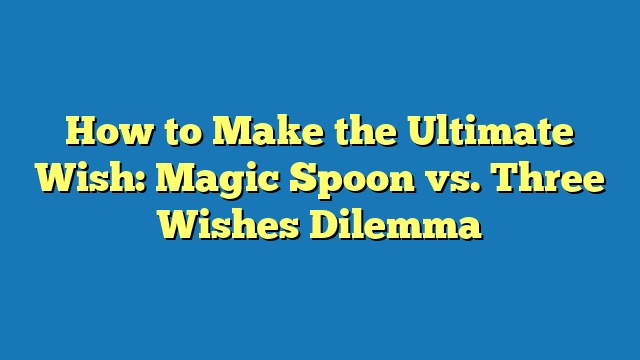Magic spoon vs three wishes refers to the choice between instant gratification and long-term satisfaction. Imagine finding a magical spoon that grants you a single wish, but also comes with a catch: each wish you make will shorten your lifespan. On the other hand, three wishes may seem more tempting, but you must carefully consider the consequences of each one, as they may have unforeseen outcomes.
The concept of “magic spoon vs three wishes” highlights the significance of planning and delayed gratification. Understanding the potential benefits and drawbacks of each choice can help you make more informed decisions. One key historical development in this context is the fable “The Fisherman and the Genie,” which explores the consequences of thoughtless wishing.
This article will delve into the psychological and practical implications of the “magic spoon vs three wishes” dilemma, examining the factors that influence our choices and the long-term impact of our decisions.
Magic Spoon vs Three Wishes
The concept of “magic spoon vs three wishes” highlights the importance of considering the essential aspects of our choices, both in terms of immediate gratification and long-term consequences. These key aspects encompass various dimensions, influencing our decision-making process and shaping the outcomes we experience.
- Consequences
- Sacrifice
- Temptation
- Patience
- Planning
- Perspective
- Responsibility
- Fulfillment
- Happiness
- Wisdom
Understanding these aspects can help us make more informed decisions, aligning our choices with our values and long-term goals. For instance, considering the consequences of each wish can prevent hasty decisions that may lead to unintended outcomes. Recognizing the value of sacrifice can help us appreciate the significance of delayed gratification and the fulfillment that comes from achieving something through our own efforts. Patience and planning empower us to resist temptations and make choices that align with our long-term vision. Ultimately, the journey of “magic spoon vs three wishes” is an exploration of our own values, desires, and the path we choose to create a meaningful and fulfilling life.
Consequences
Consequences play a pivotal role in the “magic spoon vs three wishes” concept, highlighting the cause-and-effect relationship between our choices and their outcomes. Each wish made using the magic spoon comes with a consequence, often in the form of a shortened lifespan. This forces us to carefully consider the potential impact of our wishes, weighing the immediate gratification against the long-term consequences.
One real-life example of this is the story of King Midas, who wished that everything he touched would turn to gold. While this initially brought him great wealth, it soon became a curse, as he could no longer eat, drink, or embrace his loved ones without turning them into gold. This cautionary tale illustrates the importance of considering the unintended consequences of our wishes, ensuring that we do not sacrifice our well-being or the well-being of others in pursuit of our desires.
Understanding the consequences of our wishes empowers us to make more informed decisions, aligning our choices with our values and long-term goals. It encourages us to think critically about the potential outcomes of our actions, both positive and negative, and to prioritize those that will lead to a fulfilling and meaningful life. By acknowledging the consequences of our wishes, we can avoid impulsive decisions and make choices that are in harmony with our overall well-being and the well-being of those around us.
Sacrifice
Within the framework of “magic spoon vs three wishes,” sacrifice plays a pivotal role in shaping our decisions and their consequences. The act of sacrificing something of value for a perceived greater good or benefit is an integral part of this dilemma.
-
Immediate Gratification vs. Long-Term Fulfillment
Using the magic spoon for instant gratification may require sacrificing long-term happiness or well-being. Conversely, resisting the temptation of immediate wishes can lead to greater fulfillment in the future.
-
Personal Values and Beliefs
Our values and beliefs influence what we are willing to sacrifice. For instance, someone who values health may choose to sacrifice short-term pleasures for a healthier lifestyle.
-
Opportunity Cost
Every wish made using the magic spoon comes with an opportunity cost, as it prevents us from making other wishes. Understanding the potential trade-offs involved is crucial.
-
Unforeseen Consequences
Sacrificing one thing may lead to unintended consequences affecting other areas of our lives. Carefully considering the potential ripple effects of our choices is essential.
Ultimately, the concept of sacrifice in “magic spoon vs three wishes” challenges us to weigh the immediate benefits against the potential long-term consequences and to make choices that align with our values and goals. It encourages us to embrace a thoughtful and responsible approach to decision-making, understanding that true fulfillment often requires some degree of sacrifice.
Temptation
In the realm of “magic spoon vs three wishes,” temptation plays a central role, testing our willpower and challenging us to make difficult choices. The magic spoon, with its alluring promise of instant gratification, represents the temptations that we face in life, often at the expense of our long-term well-being.
Temptation is an inherent part of the “magic spoon vs three wishes” dilemma because it forces us to confront our desires and priorities. The spoon’s tempting offer tests our ability to resist immediate pleasures and make sacrifices for future benefits. Real-life examples abound, such as the classic fable of the grasshopper and the ant, where the grasshopper succumbs to the temptation of leisure, while the ant diligently prepares for the future.
Understanding the connection between temptation and “magic spoon vs three wishes” has practical significance in our daily lives. It highlights the importance of developing self-control and making conscious choices that align with our values and goals. By recognizing the potential consequences of giving in to temptation, we can make more informed decisions that lead to long-term fulfillment.
Patience
In the context of “magic spoon vs three wishes,” patience emerges as a crucial virtue, guiding our choices and shaping the outcomes we experience. It represents the ability to resist instant gratification and make thoughtful decisions, considering the long-term consequences of our actions.
-
Delayed Gratification
Patience empowers us to delay instant gratification, recognizing that long-term rewards often outweigh short-term pleasures. For example, resisting the temptation to use the magic spoon for trivial wishes allows us to save its power for more meaningful purposes.
-
Mindful Decision-Making
Patience fosters mindful decision-making by encouraging us to carefully consider the potential outcomes of our wishes. It helps us avoid impulsive choices and make decisions that align with our values and goals.
-
Embracing Uncertainty
Patience allows us to embrace uncertainty, understanding that the path to fulfillment is not always clear or immediate. It gives us the resilience to persevere through challenges and the wisdom to recognize that true rewards often come with time and effort.
-
Cultivating Self-Control
Patience cultivates self-control, enabling us to resist the allure of immediate temptations. By practicing patience, we strengthen our willpower and develop the inner fortitude to make choices that align with our long-term vision.
Ultimately, patience serves as a guiding light in the “magic spoon vs three wishes” dilemma, reminding us of the importance of thoughtful choices and long-term fulfillment. It empowers us to resist the temptations of instant gratification, make decisions rooted in wisdom, and create a life that is both meaningful and fulfilling.
Planning
Within the intriguing realm of “magic spoon vs three wishes,” planning emerges as a pivotal aspect, guiding our choices and shaping the outcomes we experience. It represents the ability to think ahead, anticipate potential consequences, and make informed decisions that align with our long-term goals.
-
Goal Setting
Planning involves setting clear and achievable goals. In the context of “magic spoon vs three wishes,” this means carefully considering the implications of each wish and aligning it with our overall aspirations.
-
Consideration of Consequences
Effective planning requires us to anticipate the potential consequences of our actions. Using the magic spoon, for instance, demands that we weigh the immediate benefits against the long-term costs.
-
Prioritization
With only three wishes at our disposal, prioritization becomes crucial. Planning helps us determine which wishes are most important and should be used first.
-
Flexibility
Planning is not about rigidity but rather about adaptability. As we navigate the complexities of “magic spoon vs three wishes,” planning allows us to adjust our strategies based on changing circumstances.
By incorporating these facets of planning into our approach to “magic spoon vs three wishes,” we can make more informed choices, maximize the potential benefits, and minimize the risks. It empowers us to use the magic spoon thoughtfully, aligning our wishes with our values and creating a life that is both fulfilling and meaningful.
Perspective
Within the intriguing framework of “magic spoon vs three wishes,” perspective plays a pivotal role in shaping our choices and the trajectory of our lives. It encompasses the lens through which we view the world, influencing our interpretations, decisions, and overall well-being.
-
Self-Awareness
Self-awareness is a crucial aspect of perspective, enabling us to understand our strengths, weaknesses, values, and motivations. It empowers us to make choices that resonate with our true selves and align with our long-term goals.
-
Empathy
Empathy allows us to step into the shoes of others, understanding their perspectives, emotions, and experiences. This fosters compassion, understanding, and more mindful decision-making in the context of “magic spoon vs three wishes.”
-
Long-Term Vision
A long-term vision provides a guiding light, shaping our choices and decisions. By considering the potential consequences and implications of our wishes, we gain a broader perspective and make choices that align with our future aspirations.
-
Growth Mindset
A growth mindset embraces challenges and setbacks as opportunities for learning and growth. It encourages us to approach the “magic spoon vs three wishes” dilemma with an open mind, willing to adapt and adjust our perspectives as we navigate its complexities.
Understanding and incorporating these facets of perspective into our approach to “magic spoon vs three wishes” empowers us to make more informed choices, maximize the potential benefits, and minimize the risks. It helps us use the magic spoon thoughtfully, aligning our wishes with our values and creating a life that is both fulfilling and meaningful.
Responsibility
In the intricate framework of “magic spoon vs three wishes,” responsibility emerges as a critical component, shaping the choices we make and their subsequent consequences. It encompasses the obligation to consider the potential impact of our wishes, both on ourselves and on others.
The connection between responsibility and “magic spoon vs three wishes” is multifaceted. Firstly, each wish we make carries with it a degree of responsibility, as it has the potential to alter the course of our lives. Understanding the weight of this responsibility encourages us to make choices that are thoughtful, ethical, and aligned with our values.
Moreover, responsibility extends beyond the individual. Our wishes have the potential to affect not only our own lives but also the lives of those around us. Whether it’s using the magic spoon to heal the sick or to gain wealth, the consequences of our actions can ripple outwards, impacting our families, communities, and even the world at large. Recognizing this responsibility empowers us to make choices that promote the greater good.
In conclusion, responsibility plays a vital role in the realm of “magic spoon vs three wishes.” It guides our decision-making, ensuring that our choices are not only self-serving but also considerate of the potential consequences. By embracing responsibility, we harness the power of the magic spoon not only for personal gain but also for the betterment of ourselves and the world around us.
Fulfillment
Within the intriguing framework of “magic spoon vs three wishes,” fulfillment emerges as a central theme, deeply intertwined with the choices we make and the consequences that follow. Fulfillment, in this context, encompasses a sense of deep satisfaction, purpose, and meaning in life.
The connection between fulfillment and “magic spoon vs three wishes” is multifaceted. On the one hand, the magic spoon presents an alluring temptation to fulfill our desires instantly. However, true fulfillment often lies not in immediate gratification but in the journey itself, the struggles we overcome, and the growth we experience along the way. Each wish we make using the magic spoon has the potential to alter our path, potentially leading us away from the experiences and lessons that ultimately contribute to our sense of fulfillment.
Moreover, fulfillment is not merely the absence of suffering or the fulfillment of our every desire. It is an active process that requires us to engage with life, embrace challenges, and cultivate meaningful relationships and experiences. The magic spoon, with its promise of instant gratification, can distract us from these essential aspects of a fulfilling life. By focusing solely on short-term desires, we may miss out on the opportunities for growth, connection, and self-discovery that ultimately lead to a deep sense of fulfillment.
Understanding the connection between fulfillment and “magic spoon vs three wishes” has practical significance in our daily lives. It reminds us that true fulfillment comes not from external sources or quick fixes but from within ourselves. It encourages us to make choices that align with our values, pursue our passions, and cultivate gratitude for the simple joys of life. By embracing this perspective, we can navigate the complexities of “magic spoon vs three wishes” and create a life that is both meaningful and fulfilling.
Happiness
Happiness, an elusive yet universally sought-after emotion, plays a pivotal role in the realm of “magic spoon vs three wishes.” While the magic spoon offers the tantalizing prospect of instant gratification, true happiness often lies not in fulfilling desires but in embracing life’s journey, challenges, and meaningful connections.
-
Contentment
Contentment, a state of deep satisfaction and acceptance, stems from appreciating what one has rather than yearning for what one lacks. In the context of “magic spoon vs three wishes,” contentment encourages us to savor the present moment and find joy in the simple things, recognizing that true happiness does not reside in an endless pursuit of desires.
-
Purpose
Purpose, a sense of direction and meaning in life, provides a foundation for lasting happiness. It involves engaging in activities that align with our values and passions, contributing to something greater than ourselves. The magic spoon, with its potential to grant any wish, can distract us from discovering our true purpose and finding fulfillment through meaningful endeavors.
-
Relationships
Strong and fulfilling relationships are crucial for happiness. They provide emotional support, companionship, and a sense of belonging. The magic spoon, while tempting, cannot replace the genuine connections and shared experiences that contribute to true happiness. Nurturing relationships requires effort, empathy, and a willingness to invest time and energy in those we care about.
-
Growth
Personal growth and self-improvement are essential for happiness. Embracing challenges, learning from mistakes, and expanding our knowledge and skills contribute to a sense of accomplishment and fulfillment. The magic spoon, with its ability to grant instant wishes, can hinder our growth by depriving us of the experiences and lessons that ultimately lead to lasting happiness.
These facets of happiness offer valuable insights into the complexities of “magic spoon vs three wishes.” By understanding the importance of contentment, purpose, relationships, and growth, we can make more informed choices, prioritize what truly matters, and find genuine happiness that transcends the allure of instant gratification.
Wisdom
Within the intriguing framework of “magic spoon vs three wishes,” wisdom emerges as a guiding light, illuminating our choices and leading us toward a path of fulfillment and well-being. Wisdom encompasses the ability to think critically, make sound judgments, and apply knowledge and experience to navigate life’s complexities.
-
Foresight
Wisdom empowers us with foresight, enabling us to anticipate the potential consequences of our wishes before making them. It allows us to consider the long-term implications, both positive and negative, and make choices that align with our values and goals.
-
Discernment
Wisdom grants us discernment, the ability to distinguish between what is truly valuable and what is merely fleeting. It helps us prioritize our wishes, focusing on those that will bring lasting happiness and fulfillment rather than instant gratification.
-
Humility
Wisdom fosters humility, reminding us of our limitations and the importance of seeking knowledge and guidance from others. It prevents us from becoming arrogant or impulsive in our decision-making, ensuring that we approach the magic spoon with a thoughtful and balanced mindset.
-
Compassion
Wisdom cultivates compassion, enabling us to understand and empathize with the perspectives of others. It encourages us to consider the impact of our wishes not only on ourselves but also on those around us, promoting a sense of interconnectedness and shared humanity.
These facets of wisdom provide invaluable insights for navigating the complexities of “magic spoon vs three wishes.” By embracing wisdom, we gain the clarity, judgment, and empathy to make choices that are both personally fulfilling and conducive to the well-being of others. Ultimately, wisdom serves as a compass, guiding us toward a path of conscious decision-making and a life lived with purpose and meaning.
Frequently Asked Questions About “Magic Spoon vs Three Wishes”
This FAQ section provides concise answers to common questions and misconceptions surrounding the concept of “magic spoon vs three wishes.” These questions aim to clarify key aspects of the dilemma and offer additional insights.
Question 1: What is the significance of the “magic spoon vs three wishes” concept?
Answer: The “magic spoon vs three wishes” concept illustrates the tension between instant gratification and long-term fulfillment. It challenges us to consider the potential consequences and trade-offs associated with our choices.
Question 2: How can I make informed decisions when faced with this dilemma?
Answer: Informed decision-making involves understanding the implications of each choice, considering our values and goals, and seeking wisdom and guidance from others.
Question 3: What is the role of sacrifice in the “magic spoon vs three wishes” scenario?
Answer: Sacrifice plays a crucial role, as each wish often comes with a cost or consequence. It requires us to weigh the potential benefits against the potential sacrifices and make choices that align with our priorities.
Question 4: How can I resist the temptation of instant gratification?
Answer: Resisting temptation requires self-control, mindfulness, and a clear understanding of our long-term goals. It involves recognizing the potential drawbacks of impulsive choices and cultivating patience and discipline.
Question 5: What is the importance of planning in this context?
Answer: Planning is essential for making well-informed decisions about our wishes. It allows us to consider the potential outcomes, anticipate challenges, and develop strategies to maximize the benefits while minimizing the risks.
Question 6: How can I find fulfillment beyond the “magic spoon vs three wishes” dilemma?
Answer: True fulfillment lies in living a meaningful life aligned with our values and purpose. It involves pursuing our passions, cultivating relationships, engaging in personal growth, and contributing to the well-being of others.
Summary: These FAQs provide valuable insights into the complexities of the “magic spoon vs three wishes” concept. They emphasize the importance of informed decision-making, sacrifice, resisting temptation, planning, and finding fulfillment beyond instant gratification. Understanding these key aspects empowers us to navigate this dilemma thoughtfully and make choices that lead to long-term happiness and well-being.
Transition to the next section: In the next section, we will delve deeper into the practical implications of the “magic spoon vs three wishes” dilemma and explore strategies for making wise choices in various life situations.
Tips for Navigating the “Magic Spoon vs Three Wishes” Dilemma
This section provides actionable tips to help you make thoughtful choices when faced with the “magic spoon vs three wishes” dilemma. By incorporating these strategies into your decision-making process, you can increase your chances of achieving long-term satisfaction and well-being.
Tip 1: Identify Your Values and Goals
Clarify your core values and long-term goals. This will serve as a guiding compass, helping you make choices aligned with what matters most to you.
Tip 2: Consider the Potential Consequences
Before making a wish, carefully consider its potential consequences, both positive and negative. Weigh the short-term benefits against the long-term implications.
Tip 3: Practice Patience and Self-Control
Resist the temptation of instant gratification. Cultivate patience and self-control to make choices that align with your long-term vision.
Tip 4: Seek Wisdom and Guidance
Consult with trusted friends, family, or mentors for wisdom and guidance. Their perspectives can provide valuable insights and help you make informed decisions.
Tip 5: Plan and Prioritize
Create a plan for using your wishes wisely. Prioritize your wishes based on their importance and potential impact on your life.
Tip 6: Embrace Uncertainty and Flexibility
Acknowledge that the future is uncertain and be willing to adjust your plans as needed. Embrace flexibility and adaptability to navigate unforeseen circumstances.
Tip 7: Focus on the Journey
Remember that true fulfillment comes from the journey, not just the destination. Cherish the experiences, challenges, and growth opportunities along the way.
Tip 8: Cultivate Gratitude
Practice gratitude for what you already have. This will help you appreciate the present moment and make wiser choices about your wishes.
Summary: By following these tips, you can navigate the “magic spoon vs three wishes” dilemma more effectively. These strategies empower you to make thoughtful decisions, prioritize long-term fulfillment, and create a life that is both meaningful and satisfying.
Transition to the Conclusion: The insights and strategies discussed in this section provide a solid foundation for exploring the broader implications of the “magic spoon vs three wishes” dilemma. In the conclusion, we will examine how these concepts can guide us toward a life of purpose, happiness, and well-being.
Conclusion
The exploration of the “magic spoon vs three wishes” dilemma has illuminated several key insights. Firstly, it highlights the tension between instant gratification and long-term fulfillment, urging us to consider the potential consequences of our choices. Secondly, it underscores the importance of values, goals, and planning in making wise decisions that align with our purpose and aspirations. Finally, it reminds us that true happiness and fulfillment come not from external sources or quick fixes but from embracing the journey, cultivating gratitude, and living a life guided by our values.
As we navigate the complexities of life, the lessons from the “magic spoon vs three wishes” dilemma can serve as a guiding light. By prioritizing long-term goals, practicing patience and self-control, and seeking wisdom and guidance from others, we can make choices that lead to a life of meaning, purpose, and lasting fulfillment. The choice between the magic spoon and the three wishes is ultimately a choice between instant gratification and a journey of growth, self-discovery, and the pursuit of our deepest desires. Let us choose wisely and embrace the transformative power of thoughtful decision-making.









Tips for Using "Template by Kevin Crafts" Comments for Meaningful Online Discussions